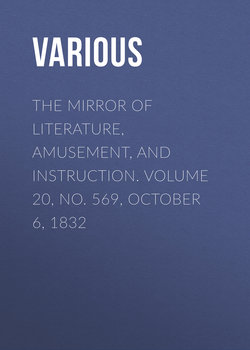Читать книгу The Mirror of Literature, Amusement, and Instruction. Volume 20, No. 569, October 6, 1832 - Various - Страница 2
RETROSPECTIVE GLEANINGS
ОглавлениеEARLY PARLIAMENTS
When the Saxon government was first established in England, there was no distinction of freehold and copyhold; the latter, according to Blackstone, was a possession acquired by a vassal subsequent to the Norman feudal system. Copyholders being thus considered as slaves, were, notwithstanding their possessions, deemed unworthy of the franchise; and from this refinement, on the arbitrary principles of the Normans, every copyholder was deprived of a vote, unless he could claim it by some other tenure.
The term borough originally meant a company consisting of ten families, which were bound together as each other's pledge. Afterwards boroughs came to signify a town, having a wall, or some sort of enclosure round; and all places that, in old times, had the name of boroughs, it is said, were fortified or fenced in some shape or other.
In the time of the West Saxons, a parliament was holden by King Ina, by these words: "I, Ina, King of the West Saxons, have caused all my fatherhood, aldermen, and wisest commons, with the goodly men of my kingdom, to consult of weighty matters."
William the Conqueror, in the fourth year of his reign, called a parliament, which consisted of twelve representatives for each county, and the cities and boroughs were wholly omitted. After the battle of Lewes, in which Henry III. was defeated by the barons, they called a parliament, and made the king sign an order to summon four knights to represent each county, and four for the cities of London, York, and Lincoln. These representatives were chosen by universal suffrage of the householders, and although the king regained his authority by the subsequent defeat of the barons, two members for each county continued to be elected in the same manner till the 8th of Henry VI. In the parliament held in the 49th of Henry III., he sent writs to the nobles and to the sheriffs of several counties, to return two knights for each county, two citizens for each city, and two burgesses for each borough.
It was contrary to an ancient rule of the constitution, that any person should be allowed to vote at elections who did not reside in the place or county where the election was made; that rule says, that "ineddem comitata commercentes et residentes" only shall vote; and this was confirmed by an act of parliament, (1 Henry V. c. i.) but recently repealed.
In 1429, an important change was made as to the qualifications of the voters for knights of the shires. The voters were obliged to prove themselves worth 40s. per annum. Before this time, every freeholder might vote, and the vast concourse of electors brought on riots and murders. Seventy pounds would, in modern days, be barely an equivalent for our ancestors' 40s. The freeholders were, at the same time, directed to choose two of the fittest and most discreet knights resident in their county; or, if none could be found, notable esquires, gentlemen by birth, and qualified to be made knights; but no yeoman or persons of inferior rank.
W.G.C.
